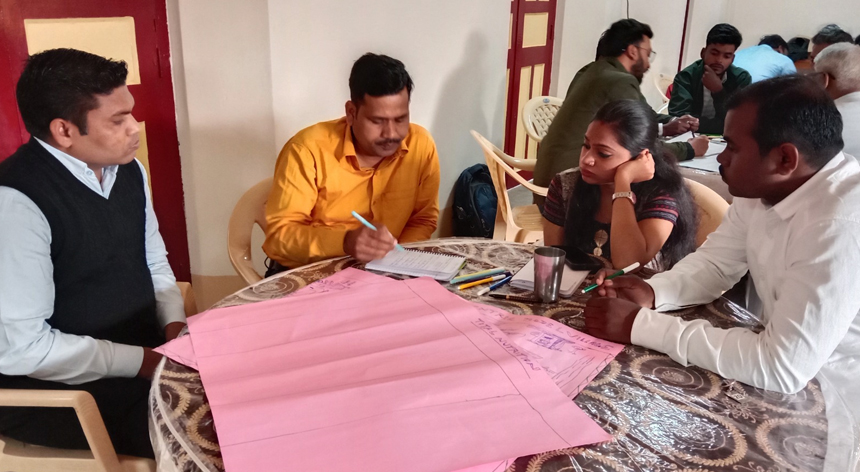Nutrition and Food Security partners from Bihar and Odisha prepared the nutrition-centric plan including a need assessment, action plan, timeline, strategies, working place, and resource sharing to address the food and nutrition security of the community.
Poverty reduction and food security are one of the main objectives of Global Program India which also contributes towards SDG2. The programme aims towards improving food security by intensive targeting by means of improved access to government programmes.
The gathering at the Sewa Kendra, Patna between 14th Feb’23 – 17th Feb’23 equipped that partner on technical aspects of Government Nutrition Programmes. Around 25 participants learnt concrete ways to maximize nutritional benefits from food security interventions by reviewing examples of successful programs and initiatives throughout the region while offering a chance to learn from the research done in the region.

It also deepens the understanding of participants on systems strengthening for mainstreaming Nutrition and Food Security as well as helps the program team learn about Community-based and People-led solutions/structures for Nutrition and Food Security. Some of the interactive methodologies adopted included – classroom sessions, participatory group discussions, group presentations and practical demonstrations in the field.
Fr. James, Director of Bihar Forum, welcomed the participants and said that the Global Program team must take this technical training into the communities. He also added that the Nutrition and Food Security Programs under Global Program India has provided an opportunity for the partners to establish strong networking and collaboration with government department at various level.
Fr. (Dr.) Jolly Puthenpura, Assistant Executive Director, Caritas India in his applauded Global Program for being acknowledged by Government at various levels.
Nutrition and Food Security Lead Mr Rajendra Singh helped in developing an understanding of the concept and determinants of Nutrition and Food Security. He covered basic definitions, concepts, understanding of growth, nutrition and malnutrition, their importance, essential food items and identification of malnourished beneficiaries in the field. To assess the prior understanding of the participants, they were also asked to prepare and present the locally available Tri-Ranga food chart.
Dr. Jaison Varghese, Senior Programme Lead for Global Programme, Caritas India, emphasized having clarity on the indicators of access to safe & nutritious food for all; Reduced Malnutrition; Enhanced Food production & Income; and Sustainability of food production. He also emphasized to focus on system strengthening approach by working in close coordination with the Integrated Child Development Scheme (ICDS) for building the capacity of ASHA & Anganwadi workers on reducing SAM/MAM; School Management Committees (SMC) for making the pertinent stakeholders aware of their roles and responsibilities and strengthening Midday Meal and School Development Plans; Reactivation of Village Health, Sanitation and Nutrition Committee (VHSNC) and Public Distribution Shop (PDS) to promote accessibility of food items to all in need.

Participants learnt about the Community-based and People-led solutions/structures for N&FS through Dr. V.R. Haridas, Thematic Lead – Climate Justice, Caritas India. He shares the importance, procedures and practices of organic farming. He also oriented on the prerequisite components of Agriculture in terms of – Dependency, Farming, Local resources, Forest, Plan, production, and productivity. He suggested methods such as crop diversification, pest prevention, seed management through traditional technologies, mulching and retention of soil moisture. The practical demonstration exercise in the field helped the participants to learn the preparation of Jeevamruth (a natural liquid fertilizer)and steps for Pollution Free Poultry Farming (PFPF) along with the preparation of Fish Amino Acids (FFJ), Fermented Fruit Juice (FFJ), Fermented Plant Juice (FPJ), Oriental Herbal Nutrients (OHN).

The team reviewed the feedback received from Mid Term Evaluation and discussed an improved strategy for Nutrition and Food Security, Change Dietary habits, Sustainable farming methods, Improved access to the government program, Regular & Reliable quality controls are carried, Control Bodies, networks – SMCs, VHSND, ICDS; Right to food and enhanced Nutritional Knowledge.
Mr. Ram Ratan, SPO, SHSB, took a detailed session on VHSND and its convergence with 4 departments i.e. Health Department, Jeevika- PRI, ICDS Department, SC/ST welfare department and VIKAS MITRA. He shared about special considerations and maternal & child health services under VHSND, targeted beneficiaries, provision of services, and roles &responsibilities of the facilitators of those services – ANM, ASHA, Anganwadi Worker, Jeevika Village organization members and Vikas Mitra (Bihar Mahadalit Manch). He also highlighted the key features of revised guidelines of VHSND such as DIO being a nodal person, clarity in roles and responsibilities of the stakeholders involved, supportive supervision, Review of Arogya Diwas based on HMIS & ANM review checklist, convergence meeting at block/district level, review of health & nutrition with AWW/ASHA by ANMs, community level management of malnourished children etc.
The key takeaway from the training session for improved Nutrition and Food Security and enhanced Social Inclusion includes –
- Strengthening of Existing System/Structure/Advocacy Group such as ICDS, VHSNC/GKS, PRI, PDS, SMC, NRC and networking/convergence among ICDS, Health, PDS, PRI & Education Department.
- Promotion of kitchen gardens among young mothers, children, and overall households.
- Creation of model for integrated nutrition garden, nutri mix and pollution free poultry farming.
- Creation of at least one model Anganwadi Centre by each partner organization.
- Adding tracking indicator to the child and mother feeding practice and coming up with target group centric interventions.
- Working to enhance community-based care for SAM/MAM children.
- Strengthening of children clubs, developing leadership, and disseminating life skill trainings.
- Model creation of schools with respect to the services under SMCs and MDM
- Monitoring dropout rate and attendance retentions
- Strengthening linkages with government schemes (Public Welfare, MGNREGA etc)
- Establishing linkages with block and district level stakeholders (SC/ST department, Tola Sewak).
- Ensuring regular participation of community members in Gram Sabha, submission of plans and constant follow ups


Leave a Reply